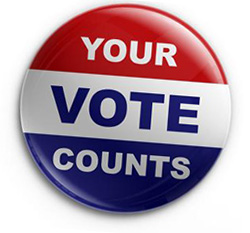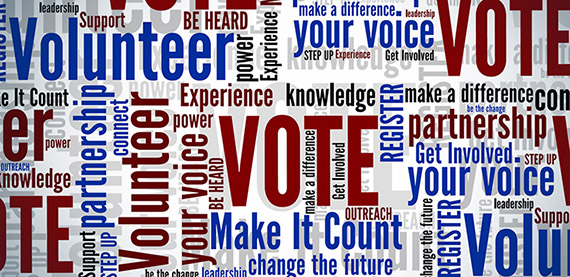by Hinkle, Prior & Fischer
Voting is an important right for all Americans, so with Election Day approaching, it is important to consider the voting rights of people with disabilities.
 This post is dedicated to helping readers understand those rights, as well as how to access the supports they might need to exercise those rights. In both New Jersey and Pennsylvania, all citizens are eligible to vote, as long as they are over the age of eighteen, reside in the state, and are properly registered to vote. The mere fact a person has a disability is not an automatic bar to voting, but rules vary by state.
This post is dedicated to helping readers understand those rights, as well as how to access the supports they might need to exercise those rights. In both New Jersey and Pennsylvania, all citizens are eligible to vote, as long as they are over the age of eighteen, reside in the state, and are properly registered to vote. The mere fact a person has a disability is not an automatic bar to voting, but rules vary by state.

Voting in New Jersey
In New Jersey, there are two leading cases involving the rights of individuals with disabilities to vote. Both were handled by attorneys at our firm.
A 1975 case, Carroll v. Cobb, involved residents of a State-operated institution for people with developmental disabilities who attempted to register to vote but were turned away by a municipal clerk because they lived in an institution. The court ruled that their residence in an institution did not preclude them from the right to register to vote, so long as they can answer the few basic questions asked of any other citizen on a voter registration form such as name, address, age and so forth.
In 2000, election officials refused to count absentee ballots submitted by voters hospitalized in a state-operated psychiatric hospital based on the assumption that they lacked the capacity to vote (In the Matter of Absentee Ballots Cast by Residents of Trenton Psychiatric Hospital). The court confirmed that voting is a “fundamental right” guaranteed by the United States Constitution, and ruled that anyone seeking to challenge an individual’s right to vote has the burden of proving the specific person in question lacks the capacity to vote. As a result of these two cases, individuals with disabilities cannot be deprived of their right to vote by clerks, election officials, poll workers, or any other official involved in the election process.
Finally, in November 2007, the New Jersey Constitution was amended to further clarify this right, stating that only a person who has been determined by a court of law to “lack the capacity to understand the act of voting” can be deprived of the right to vote. Therefore, only a judge can deny an individual the right to vote. The appointment of a guardian for an individual with disabilities does not automatically prevent the individual from voting unless the judge specifically addressed and clearly stated that the individual lacks the capacity to vote.
Additionally, everyone, including individuals with disabilities, has a right to receive help with the voting process including choosing someone to help in the voting booth, as well as taking extra time to cast a vote. On Election Day, voters have the right to have someone show him or her how to use the voting equipment. Further, if a voter makes a mistake while voting, he or she has a right to have someone explain how to fix the mistake. All voters have the right to make up their own mind about who to vote for and how to vote on any ballot question.
It a voter has trouble voting at the polling place on Election Day, call the county Board of Elections. The Board of Elections’ staff should be able to address and correct the situation that day. Voters are allowed to have someone call on their behalf.
Voting In Pennsylvania
Pennsylvania has passed laws meant to make voting more accessible for individuals with a disability. An individual with a disability who can go to the polling place and cast a vote unassisted need not take any extra steps to vote, other than those every voter must take, such as registering to vote, meeting the citizenship, residency, and age requirements.
However, not every individual with a disability is able to cast their ballot unassisted. Individuals who cannot travel to the polling place or cannot operate the ballot-casting machinery by themselves will need to take additional steps in order to vote with assistance or through an absentee ballot. An individual who, because of illness or physical disability, is unable to attend the polling place, or who would be unable to operate a voting machine even with assistance, can qualify for an absentee ballot. To secure an absentee ballot the voter must send a signed letter to the county board of elections in the county in which they are voting. The letter should include the voter’s name, occupation, birth date, address, how long the individual has resided at that address, and where the absentee ballot should be sent to. Additionally, the letter must declare the nature of the disability, and the name, address, and phone number of the voter’s attending physician, and explain that disability is the reason an absentee ballot is required.
If an individual with a disability can travel to the polling place, but cannot operate the voting machine, Pennsylvania law allows for individuals with disabilities to have assistance. In order to qualify for assistance at the polling place an individual with a disability must personally apply to the voting commission, registrar, or clerk. Such application must give the nature of the disability, which must then be recorded on the voter’s registration card. Otherwise, a voter may also complete a declaration of disability at the polling place at the time of voting. The voter may choose someone to accompany him or her in the voting booth, and that person may assist the voter in casting their ballot.
As Election Day approaches it is important for self-advocates, families, and other caregivers to understand these rights so that people with disabilities can fully and freely exercise their right to vote.
 Or
Or 


 Hinkle, Prior & Fischer attorneys are available to speak to your organization or constituents on a wide variety of relevant disability topics.
Hinkle, Prior & Fischer attorneys are available to speak to your organization or constituents on a wide variety of relevant disability topics. 